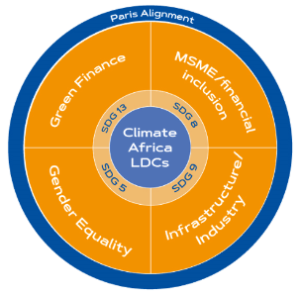In our strategy 2024-2028 we have chosen the fields of green finance, micro, small and medium-sized enterprises (MSMEs) and financial inclusion, private infrastructure and industry, and gender equality as our focus areas. We are committed to Paris Alignment at project and portfolio level and aim to strengthen our activities in Africa and Least Developed Countries.
Better living conditions through a vibrant private sector
Our mission is to finance sustainable private-sector projects in developing countries around the world that make sense in terms of development policy and are economically viable. Our projects aim to improve the living conditions of local people and support the implementation of the Sustainable Development Goals (SDGs).
With our projects we contribute to a vibrant economy and thus create better living conditions for people in developing countries. In doing so, we are guided by the vision of a good life for the 8.5 billion people who will inhabit the earth in 2030 within the ecological limits of the planet and take account of the commitment given by Austria at the Paris Climate Conference to make its own contribution towards the international goal of climate financing.
Our focus areas
In the current strategy period 2024-2028, our strategic focus is on the following four key areas:
Climate protection
We are committed to the United Nations International Climate Goal and the Paris Alignment at project and portfolio level.
Other topics
We have limited scope to support investments that go beyond the strategic focus areas if they have a high added value in terms of development policy or serve significant Austrian foreign trade interests in developing countries.
Geographical orientation
We see ourselves as a thematically focused development bank with a broad geographical approach. We can operate in all developing countries according to the OECD DAC list and have not established a fixed list of priority countries and regions.
Our aim is to achieve a broad, geographically balanced diversification of our committed portfolio and to strengthen our commitment in Africa and the least developed countries (LDCs).
Policy Papers complementing our strategy
Complementing our strategy 2024-2028, we have published four policy papers to detail and operationalise our strategy in the areas of additionality, technical assistance, Paris Alignment and human rights. The policy papers detail our approaches in the areas mentioned, describe strategies for their integration into internal bank processes and define responsibilities for implementation, monitoring and periodic revisions.
The concept of additionality is of central importance to OeEB as a development bank in order to differentiate itself from commercial banks. Additionality refers to the financing of projects in regions, sectors and segments that the private financial sector or capital market cannot adequately provide or that create development impacts which otherwise would not have occured. In its policy paper, OeEB describes its understanding of additionality, which is based on the definitions of the Organization for Economic Cooperation and Development (OECD), and explains how additionality is integrated into the bank's investment processes.
In developing and emerging countries, private companies and financial intermediaries not only need access to tailor-made financing such as loans and equity investments, but also access to technical assistance (TA) funds. The policy paper describes how OeEB intends to use its TA offering to strengthen the development impact of its projects, deepen the additionality of its financing and support the transformation path of its partners.
As a green development bank, OeEB is committed to playing a pioneering role in mitigating climate change and adapting to its unavoidable effects. In its policy paper, OeEB defines how it intends to (i) review all new activities for their compatibility with the goals of the Paris Climate Agreement, (ii) achieve a climate-neutral portfolio by 2040, (iii) continue to make an ambitious contribution to international climate finance, (iv) drive climate ambitions within the network of European Development Banks (EDFI) as well as OeEB’s clients and (v) align internal processes in a climate-friendly manner.
The realization of human rights, as set out in the UN Guiding Principles on Business and Human Rights, is fundamental to tackling global social and environmental challenges and achieving positive development effects. In its policy paper, OeEB clarifies its position and explains how it incorporates human rights into its environmental and social management, which standards are applied and what expectations it has of its portfolio companies. As part of the human rights policy, OeEB has also revised its grievance mechanism which aims to process complaints about environmental, social and human rights violations caused by OeEB or its portfolio companies.

